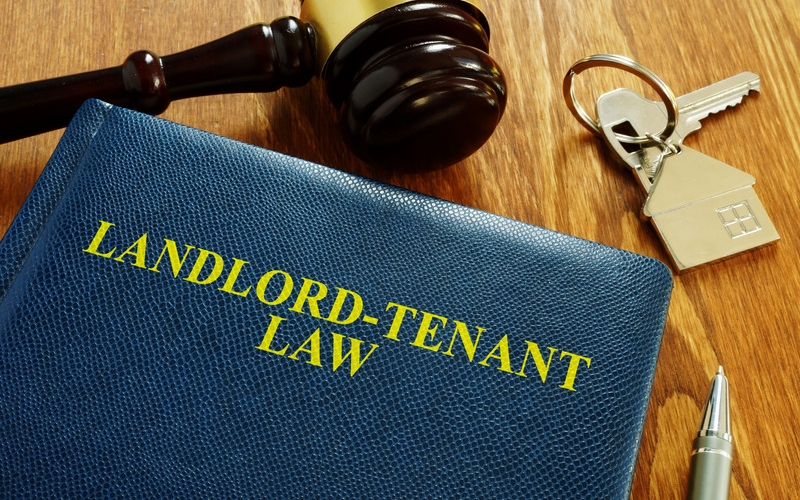Once you start renting a rental property in Georgia, you automatically obtain certain rights. These rights are enshrined under Chapter 7, Title 44 of Georgia Codes. These guarantee you protection against potentially difficult landlords who may want to violate your rights.
In today’s blog, we’ll look at 9 things that a landlord cannot do in Georgia.
Illegal Things a Landlord Cannot Do In Georgia
1. A landlord cannot rent an uninhabitable property in Georgia.
As a tenant, you have a right to live in a habitable rental unit. As per Georgia’s implied warranty of habitability (§ 44-7-13), your landlord must provide you with a livable space that meets the state’s basic health and safety codes.
The following are some of the things that make a rental unit in Georgia habitable.
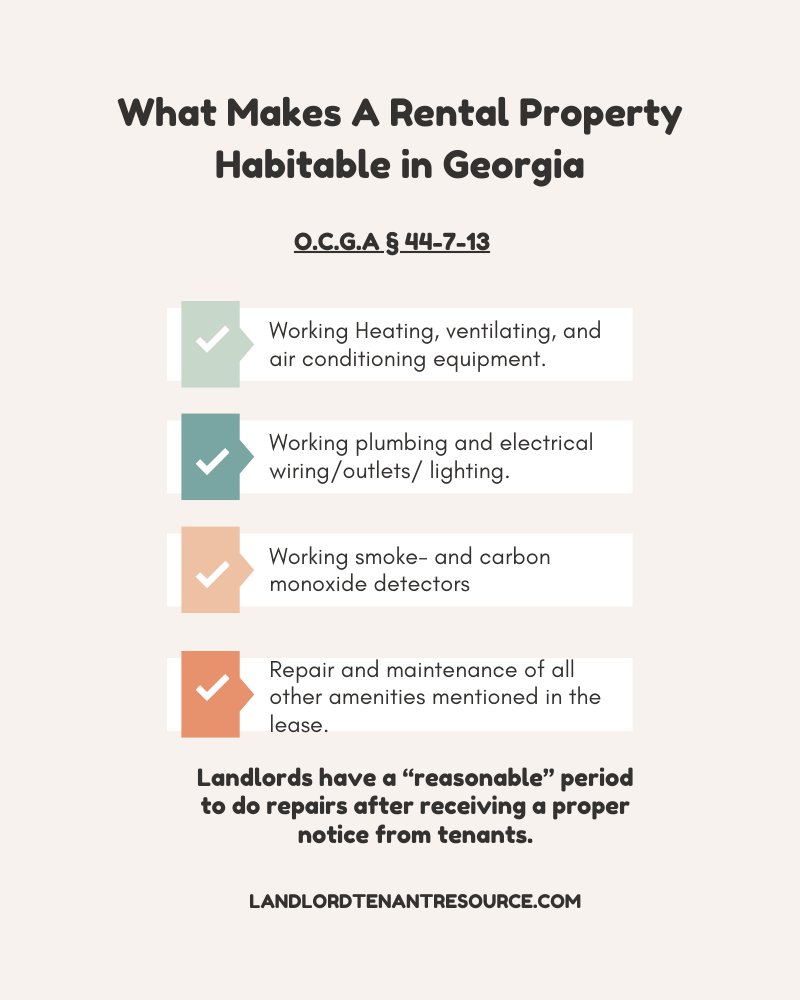
Additionally, the unit must not have mold or even pests at least by the time you’re moving in.
2. A landlord cannot refuse to make necessary repairs.
This requirement is also part of Georgia’s habitability laws. A landlord must make repairs within a “reasonable time” after proper notification from a tenant.
The following is a sample notice you can use when requesting the landlord for repairs.
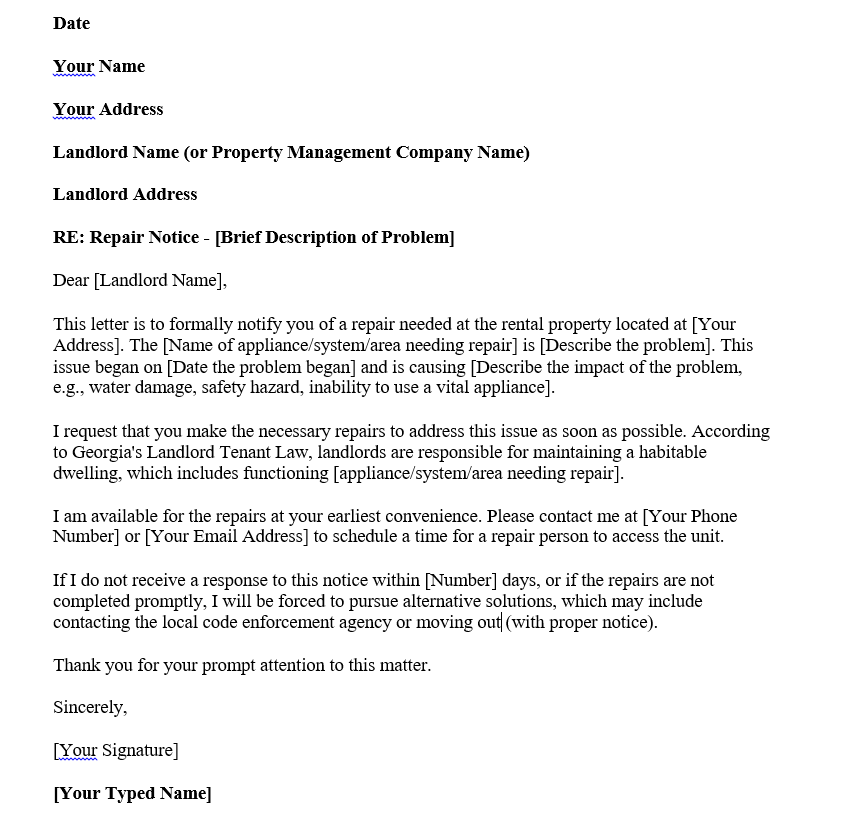
If the landlord fails to make the repairs within a timely manner, you may be able to pursue certain legal alternatives.
Including, doing the repairs yourself and then deducting the cost from future rent payments, terminating the lease without penalty, and suing for costs of damage caused to your personal property.
3. A landlord cannot forcefully evict you from the property.
Just because the landlord owns the property doesn’t mean they kick you out whenever they wish. They cannot do things like throw out your property, lock you out, or shut down your utilities.
Legitimate reasons for tenant eviction in Georgia include:
- Failing to pay rent.
- Violating a term of the lease agreement.
- Not having a lease.
The only way a Georgia landlord can evict a tenant is by obtaining a court order. This may take anywhere between 1 and 3 months. It may take even longer if you choose to fight the eviction or file an appeal after the judgment.
Here’s everything you need to know when it comes to fighting an eviction.
The eviction tsunami is here. So, if you are a nervous tenant or maybe you are a kind-hearted probate lawyer whose cousin just received an eviction lawsuit, watch on because eviction legal actions are unlike any other. You have to know how to fight them.
So, let me begin with two disclaimers. First, I slant pro-tenants. So landlords out there, I understand that you're probably very frustrated, and you have problems, and you have a mortgage to pay. Trust me, I understand that, but I'm kind of tenant-oriented, and that's what this is focused on. Second, landlord-tenant laws vary state by state, and I only have time to give you the important things that you need to be aware of in this legal brief.
According to this article from CNBC, over 32 percent of households failed to make all the rent payments in July of this year, right before all the eviction moratoriums ended.
That's 32%, and now it looks like Congress is not going to approve the additional $600 unemployment payments per week, so this is just going to be horrible. I heard from a lawyer friend of mine who does evictions for landlords that she has about 500 cases to file next month. 500 eviction actions and she's just a one-small-person law firm. So, the wave is coming, and here are the things you have to know.
One, an eviction case moves much quicker than any other kind of lawsuit. Landlords long ago got legislators to speed up the process of eviction, and perhaps rightfully so.
Lawsuits, regular lawsuits, take months, or years to complete, so eviction lawsuits are super streamlined. Upon receiving the eviction lawsuit, you only have days, sometimes as little as five days, to respond and avoid a default.
Next, landlord-tenant law is focused on pre-suit requirements. State laws go into much detail and have very complex laws on what a landlord must do to evict a tenant. The laws require notices served or posted within a certain number of days after non-payment.
The first notice is a notice to pay rent or quit, and this is what is served when you miss rent. You can see in this example form that not only must the landlord put in the exact amount of rent that is overdue but must also put in the exact date that the tenant must move out, and he must, or she must, serve it in very specific ways.
Now, because statutory pre-suit requirements are strictly construed, the very first thing you look for is whether the landlord put the exact correct amount of rent that is owed and put the correct move-out date.
If anything is off, that can be a complete defense to the eviction lawsuit, forcing the landlord to start all over and having the lawsuit dismissed. Hint: how was the tenant given notice? That's something that they'll often mess up. So, failures of condition preceding is your first line of defense.
The next thing to keep in mind is that if you're going to attempt to argue over the amount due and owing, you almost always are going to have to deposit the disputed rent with the court. So, in case you lose, the landlord will get paid. Now, this is usually going to be a losing proposition in these coming months, especially because the problem is that people don't have jobs and don't have the money to pay.
So, putting the rent into the registry is a no-go from the get-go. So, that's something you're going to have to keep in mind. Most of the time, if you don't have the money to pay rent into the court and you can't find an exception, you are going to lose as though you hadn't even answered the complaint.
This is key. I mean, you won't even be able to say anything to the judge. No money, no argument. Remember that. But in every state, there are exceptions to this rule, and again, I don't have time to go into every state's law, but look at the Florida statute, for example.
Here you can see the requirement that the disputed rent be paid into the court registry, but hiding in there, if you look hard, is an exception. You have to pay into the registry or, I love the word "or," or file a motion to determine the amount of the rent.
So, your job in fighting an eviction is to look at the landlord-tenant statute in your state and find the exceptions to the deposit rule. Fitting your argument into an exception will allow you to fight the eviction without having to pay the full amount of rent, and even if you lose, it will buy you time.
And if you cannot find a defense or you lose in court, the final arrow in the tenant defense quiver is bankruptcy. The automatic stay when you file bankruptcy will stop an eviction right away.
It is then required of the landlord that he or she ask the bankruptcy court to lift the stay and allow the eviction to continue. In my experience, a bankruptcy petition can allow a tenant to get out from other onerous payments and bring the landlord to the table as far as working something out with them because now you've added a layer of difficulty to kicking you out of your place. If anything, it requires the landlord to find a lawyer admitted to the bankruptcy court in your area, and that alone takes time.
So remember, you have to move fast in defending eviction. Look at the landlord's pre-suit requirements very closely and find an argument that doesn't require you to make payment of the rent, and if all else fails, think about bankruptcy if things are that bad. I know times are bad for a lot of people right now. Take care and best of luck to you and yours.
4. A landlord cannot retaliate against you in Georgia.
Landlord retaliation happens when a tenant takes a protected action against their landlord. Some of the protected actions you can take include the following.
- Reporting the landlord to government authorities for habitability violations.
- Joining or forming a tenants’ union to advocate for better conditions or to push back on rent increases.
After taking such lawful actions, your landlord may not then engage in illegal retaliatory tactics. Such as, increasing your rent, threatening you with an eviction, reducing essential services, entering the property illegally, or start making repairs difficult.
5. A landlord cannot fail to return the deposit within 30 days.
Most landlords in Georgia require tenants to pay a security deposit as part of the initial move-in costs. But while they are within their rights to ask it, they must abide by certain rules.
Among these rules is returning it (or whatever portion remains) within 30 days. The only allowable deductions the landlord can make are for unpaid rent, late fees, pet fees, cleaning costs, costs due to abandonment, or costs of fixing damage exceeding normal wear and tear.
Wrongfully withholding a tenant’s deposit usually results in significant penalties. Including, up to 3X the wrongfully withheld amount, plus reasonable court and attorney fees.
Besides abiding by the 30 days’ time limit for return, the landlord must also follow these rules as well.
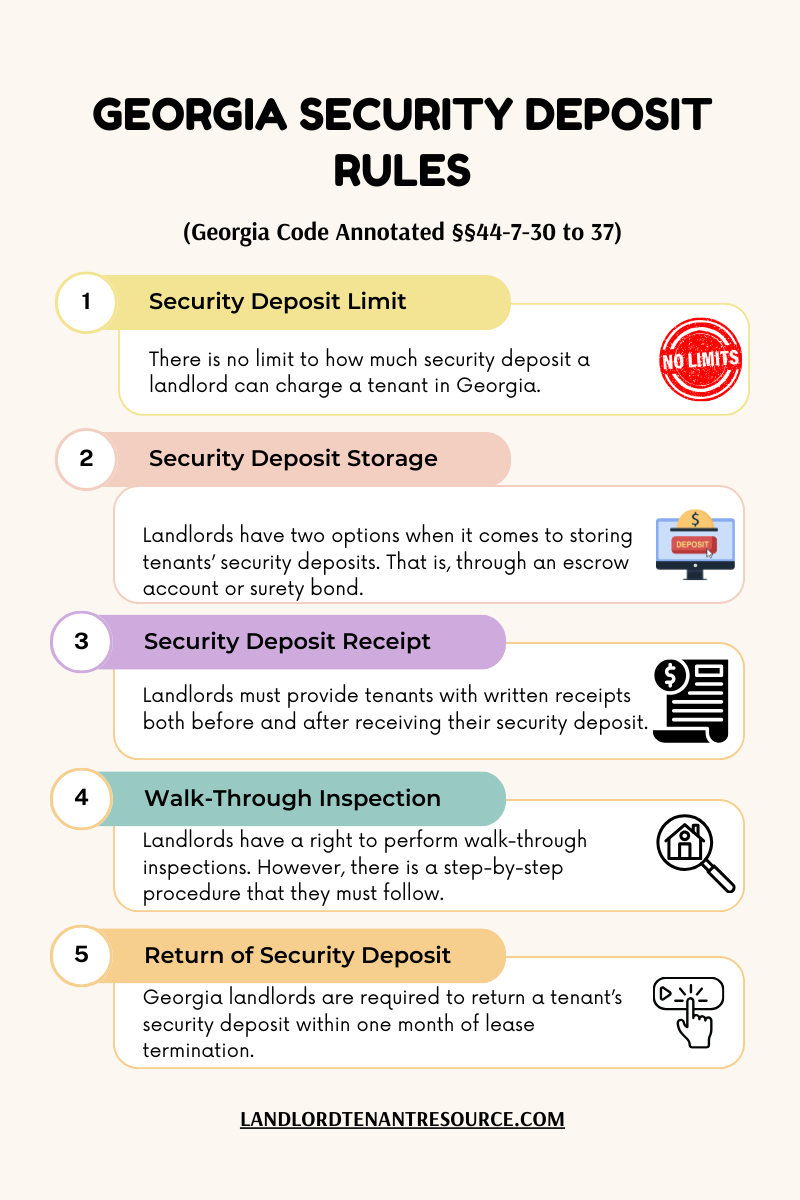
6. A landlord cannot terminate a periodic lease without notice.
While landlords have a right to terminate a periodic lease, they must first serve proper notice. Specifically, the landlord must serve a 60 days’ notice before terminating your periodic lease, whether you’re on a week-to-week, month-to-month, or a quarter-to-quarter lease.
On your part, you’d only need to provide the landlord with a 30 days’ notice regardless of the length of the lease term.
What’s more, Georgia tenants may also be able to terminate their fixed-term leases for legally justified reasons. Such reasons include the following.
- If starting active military duty.
- If the unit becomes uninhabitable.
- If you become a victim of landlord harassment.
- If you become a victim of domestic violence.
- If there is an early termination clause in the lease.
But even so, you must make sure you provide the landlord with relevant proof and proper notice before moving out.
7. A landlord cannot raise rent illegally in Georgia.
Unfortunately for tenants in Georgia, there is no rent control. Also, state law prohibits local jurisdictions from creating their own rent control laws.
What this means is that a landlord can raise rent by any amount and do so as often as they deem fit.
That said, there is a limit to what they can do when it comes to rent raises. They must not raise it out of discrimination of a protected class. Or, raise it in retaliation because you exercised a legal right, such as reporting them for habitability violations.
8. A landlord cannot discriminate against you based on a protected class.
Passed into law on April 11th, 1968 by President Lyndon B. Johnson, the Federal Fair Housing Act protects tenants against discrimination by landlords based on 7 protected classes.
The classes are: race, color, religion, nationality, familial status, sex, and disability.
For instance, your landlord cannot offer you different lease terms than what they are offering others. Such as, charging you a higher rent because of your nationality or sex.
9. A landlord cannot enter your property illegally.
As a tenant, you have a right to enjoy your property in peace and quiet. And while Georgia law doesn’t specify any landlord entry rules, their entry must meet certain minimum rules.
For one, the landlord must enter the property for purposes reasonably related to the lease agreement. Common reasons for landlord entry include inspections, repairs, maintenance, and property showing.
And two, the landlord must enter during normal business hours. Typically, this is the period between 8 AM and 5 PM or as otherwise agreed.
Frequently Asked Questions (FAQs): What a Landlord Cannot Do in Georgia
Q: Can a landlord evict you for no reason in Georgia?
A: The simple answer is NO! A landlord in Georgia must have a legitimate reason for tenant eviction, such as failing to pay rent, violating a term of the lease agreement, or engaging in illegal activity. A landlord cannot try to evict you just because they feel like it.
And even without a lease, the landlord cannot just lock you out, throw out your belongings, or shut down your utilities. They must follow the statewide eviction process to remove you from the premises.
Q: What rights do tenants have in Georgia?
A: As a tenant in Georgia, you enjoy a smorgasbord of rights under state law (GA Code Title 44 Chapter 7). The following is a basic overview.
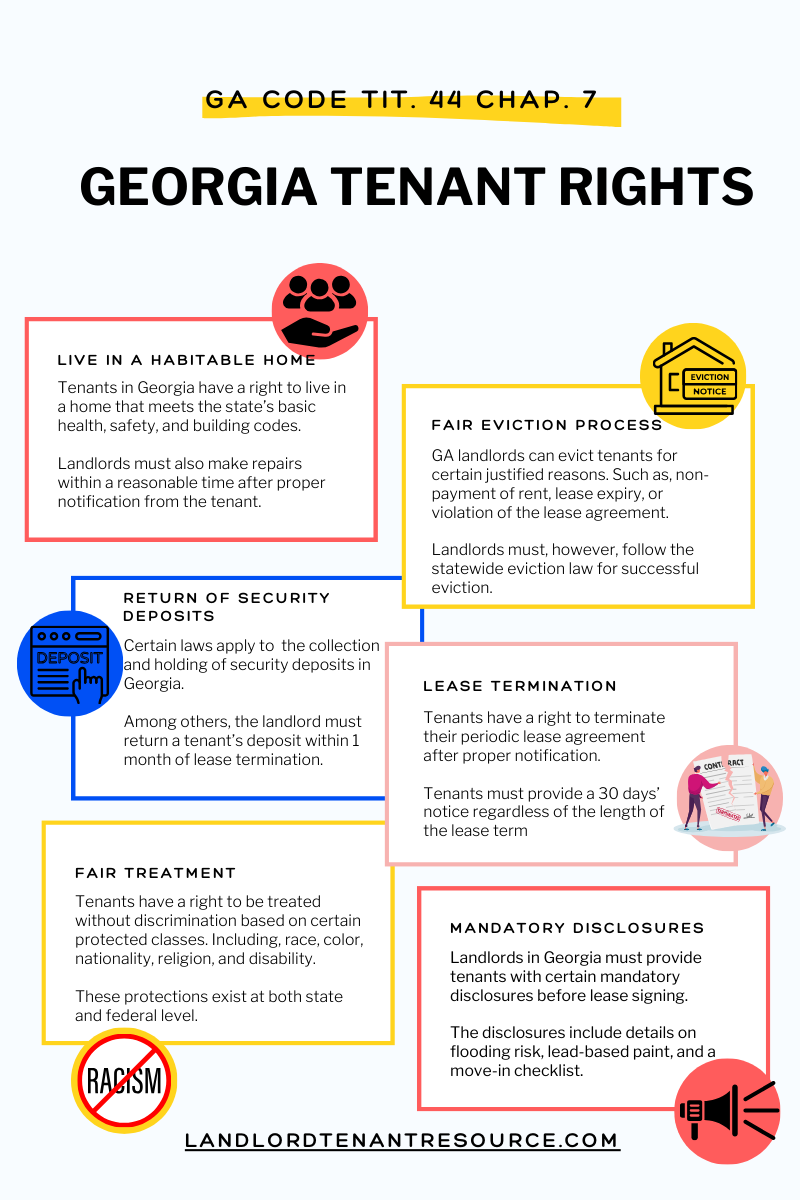
Q: How much can a landlord legally raise the rent in Georgia?
A: Unfortunately for tenants in Georgia, there are currently no laws restricting how much a landlord can raise rent. Landlords can raise rent by whatever they want and as frequently as they wish to do so.
However, the landlord must provide you with a notice of at least 60 days before raising your rent. Additionally, the rent raise must not be borne out of discrimination of a federally-protected class or in retaliation because of exercising a legal right.
Q: Who can I report my landlord to in Georgia?
A: If you have reasons to believe that your landlord has violated your rights, there are a couple of agencies which you can file a report with.
If you believe you have been a victim of discrimination, you can file a complaint with the state’s Commission on Equal Opportunity (GCEO). Alternatively, you can also take up the matter with the Department of Urban Development (HUD).
If the issue is related to the unit’s habitability, you can file a complaint with the county housing inspector.
Conclusion
Clearly, there is a smorgasbord of things a landlord cannot do in Georgia. From security deposit rules, to landlord entry, to habitability codes, and everything in between, you have a myriad of protections under federal and state laws.
Disclosure: The content herein isn’t a substitute for advice from a professional attorney. It’s only meant to serve educational purposes. If you have a specific question, kindly seek expert attorney services.
Sources: Georgia Attorney General's Consumer Protection Division, How to File a Complaint Against a Georgia Landlord, GA Code Title 44 Chapter 7, Warranty of Habitability
Last Updated on May 25, 2024 by Kelvin Nielsen

Hi, I’m Kelvin Nielsen, an experienced landlord and accomplished real estate lawyer. My focus is on answering your questions about renting in the hopes of making your life as a renter or a landlord a bit easier.

